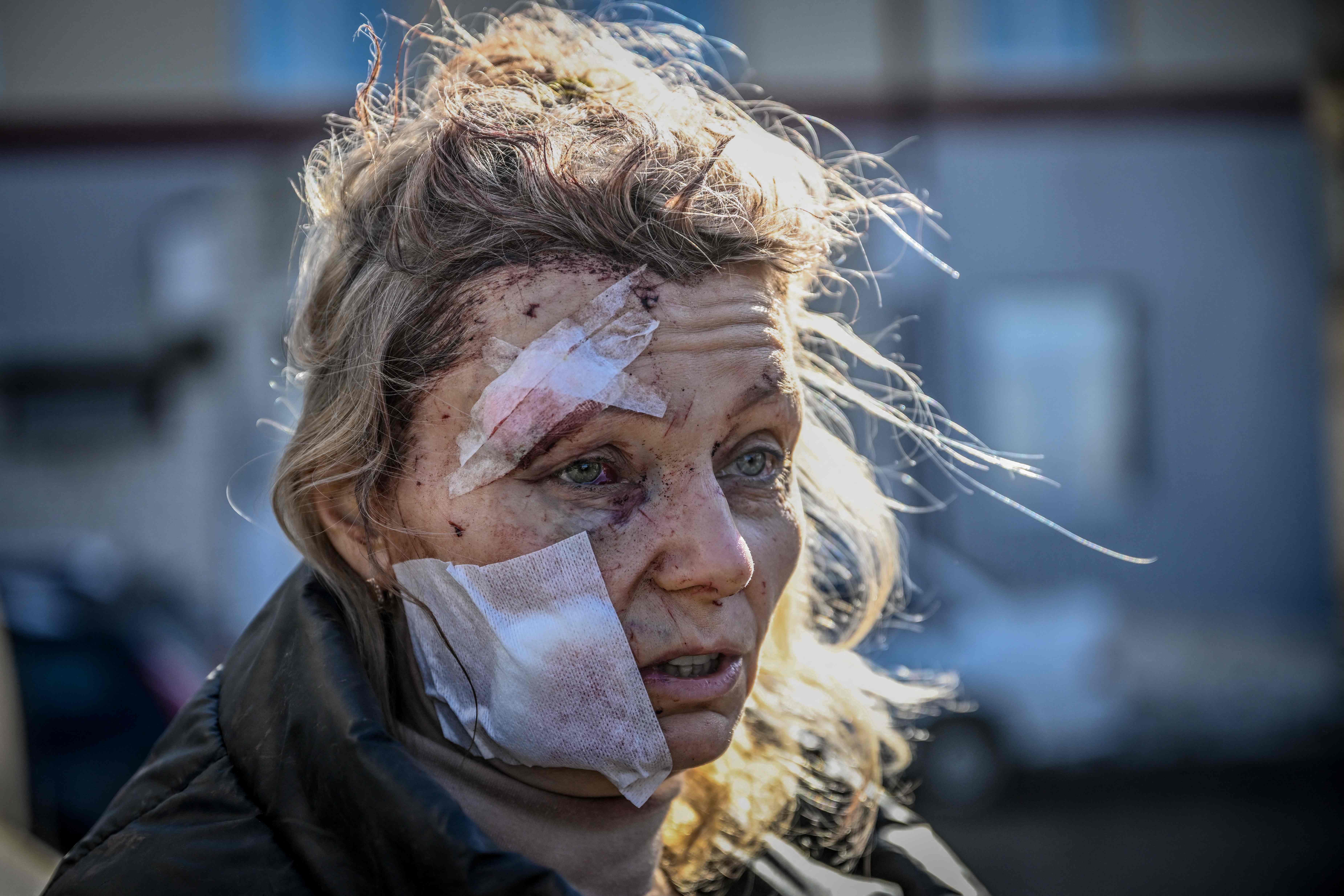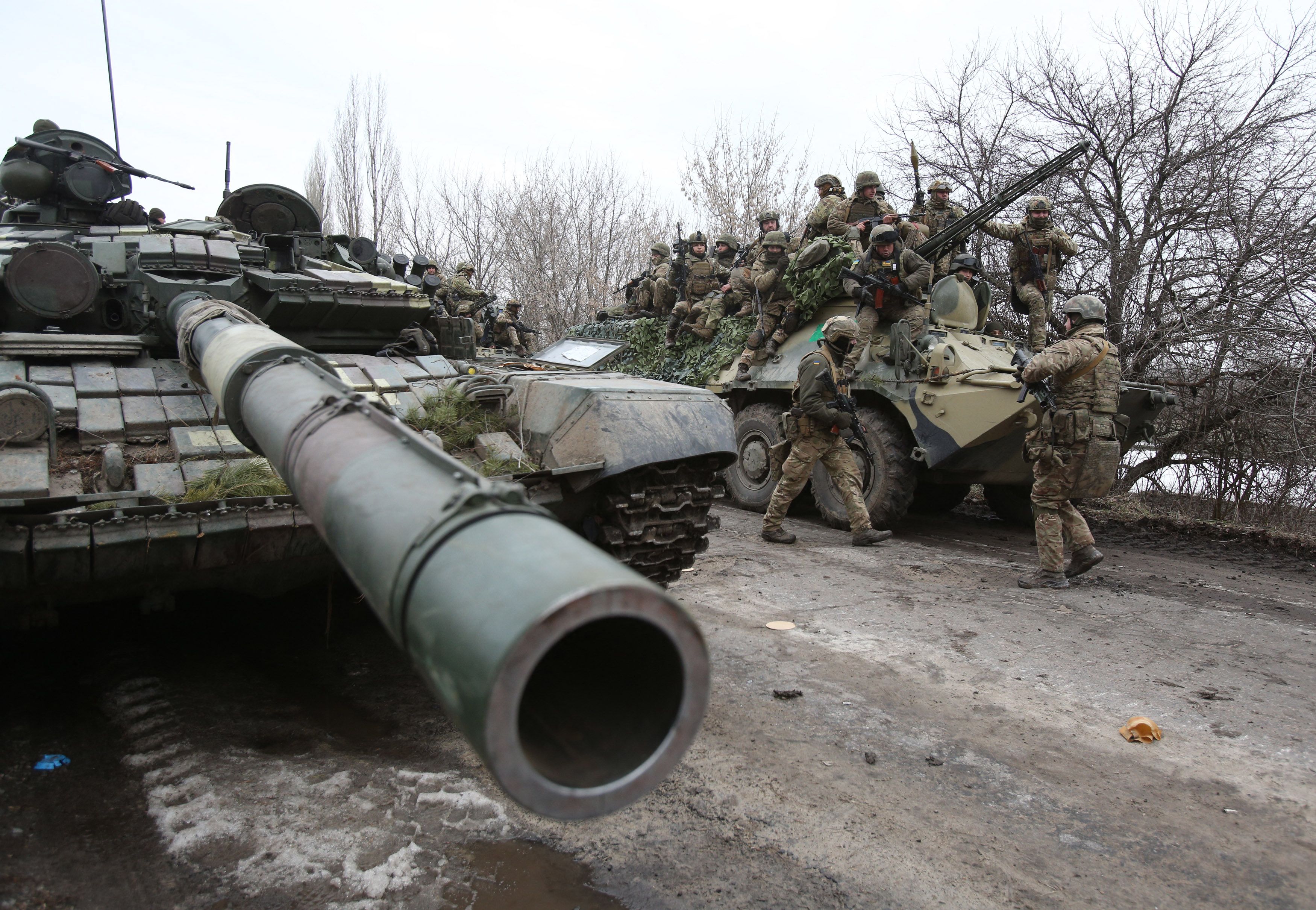
Russia unleashed all-out war on Ukraine from land, sea and air on Thursday, attacking targets all around the country including the capital Kiev, pushing Europe towards its most ruinous conflict since 1945 and prompting international fury at the actions of president Vladimir Putin.
It was a momentous day for Europe and the world – a day that saw at least 57 Ukrainians killed and another 169 injured, according to Ukraine’s health ministry. Western countries promised new and tougher sanctions, while protesters gathered across the world against Putin’s military action, including in Russia, and a potential refugee crisis and a jump in energy prices looked imminent.
Ukraine’s president Volodymyr Zelensky accused president Putin of trying to lower a “new iron curtain” across the continent.
“What we have heard today are not just missile blasts, fighting and the rumble of aircraft,” said Mr Zelensky. “This is the sound of a new iron curtain, which has come down and is closing Russia off from the civilised world. Our national task is to make sure this curtain does not fall across our land.”
And he warned that Russia would not stop at Ukraine. “If you don’t help us now,” he told the international community, “if you fail to offer a powerful assistance to Ukraine, tomorrow the war will knock on your door.”
As Russian troops made further inroads, they captured the infamous Chernobyl nuclear plant, where a reactor exploded in 1986, spewing a radioactive cloud across Europe. Moscow’s defence ministry also claimed to have “neutralised” Ukraine’s air defences and wiped out 11 airfields.
The devastating assault began early this morning, with Putin, with a huge arsenal of nuclear warheads behind him, warning the international community not to interfere. “If you do you will face consequences greater than any of you have faced in history,” he claimed.
He vowed “to defend people who have been victims” of what he dubbed “the Kiev regime” and said that he would “demilitarise and de-Nazify Ukraine” – tapping into a baseless and long-standing Russian narrative that suggests the country is being subjugated by right-wing radicals.
Missiles were fired at key military and infrastructure targets inside Ukraine. Luhansk, Sumy and Chernihiv, in the east of Ukraine, were all subjected to attacks, while tanks battled on the outskirts of Kharkiv, after paratroopers dropped in.

An amphibious assault on the key port city of Mariupol was launched, and ground forces are now moving in across the country from Russia, Crimea and its vassal state, Belarus, which is close to Kiev. Another key city, Odessa, is also said to be under attack.
A Ministry of Defence intelligence update said Russia’s air strikes had targeted military infrastructure – especially command and control and air defence installations – and that the Ukrainian forces had “put up a staunch resistance and continue to hold key cities”.
In the capital, where almost three million people live, air sirens forced residents to desperately seek shelter in the city’s underground. Bomb explosions were heard close to Kiev itself, including an air assault on Hostomel Airport.
According to a senior US defence official, Russian troops are making a move on Kiev, where a local curfew has now been imposed.

Footage has emerged of dogfights between Ukrainian and Russian jets, with Kiev claiming to have brought down seven aircraft. Social media videos showed apartment buildings hit in residential areas in Kharkhiv and scores of Ukrainians queuing to donate blood.
Ukrainians have begun to flee the county’s main urban centres, including the capital and south-western city of Mariupol. Many who stayed sought shelter in basements or in the Kiev metro system.
One resident, Ihor Nazarenko, told The Independent: “It is about one man; an angry bitter man who wants to punish us because we will not accept what he wants.”
Those who have remained say they have been able to access food and water, but this could change in the wake of the Ukraine military suspending commercial shipping at its ports.
Mr Zelensky urged citizens to defend the country from Russian forces and said weapons would be issued to everyone who came forward. Ten thousand automatic rifles had been handed out to civilians in Kiev in the past few hours, according to Denys Monastyrsky, the Ukrainian interior minister.
In the US, president Joe Biden accused Russia of an “unprovoked and unjustified attack” and said: “The world will hold Russia accountable.”

Germany’s chancellor Olaf Scholz said the Russian leader “was endangering the lives of countless innocent people” and pinned the blame on Putin. He added: “For all that there is no justification. This is Putin’s war”.
The G7 nations were meeting to decide on a response, while Ukrainians protested the Russian invasion outside Downing Street.
In Moscow’s Pushkin Square, around 2,000 protesters bravely took to the streets to voice their anger at their own government’s invasion, with another 1,000 gathering in St Petersburg. A reported 700 have been arrested.
Boris Johnson called Russia’s actions “a catastrophe for our continent” and European Commission foreign policy chief, Josep Borrell, described the move as “among the darkest hours of Europe since the end of World War II.”
France’s Emmanuel Macron said Russia’s actions marked “a turning point in the history of Europe”.
Mr Johnson called on Europe to sever the continent’s dependence on Russian oil, which has given the Kremlin a “grip” on Western politics, he said.
As part of the package of sanctions unveiled by the UK, Russian airline Aeroflot will imminently be banned from the UK, while there will be an asset freeze on all major Russian banks, including immediately against VTB.
A Kremlin spokesman shrugged off threats from western leaders and said Russia could not be placed behind an “Iron Curtain” once more.
It is the second time Moscow has launched a military incursion into Ukraine since the country gained independence from the Soviet Union in 1991, and comes eight years after the annexation of the Crimean peninsula.







